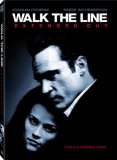| Reviews & Columns |
|
Reviews DVD TV on DVD Blu-ray 4K UHD International DVDs In Theaters Reviews by Studio Video Games Features Collector Series DVDs Easter Egg Database Interviews DVD Talk Radio Feature Articles Columns Anime Talk DVD Savant Horror DVDs The M.O.D. Squad Art House HD Talk Silent DVD
|
DVD Talk Forum |
|
|
| Resources |
|
DVD Price Search Customer Service #'s RCE Info Links |
|
Columns
|
|
|
Walk the Line: Extended Cut
20th Century-Fox has gone back to the well one more time for The Man in Black with Walk the Line: Extended Cut, the third DVD incarnation of 2005's wonderfully romantic biopic of music legends June Carter and Johnny Cash. All the extras from the two previous DVD releases are here, along with a few more for Cash fanatics who want to re-experience this Oscar-winning showstopper. As for that "extended cut," it feels more like a marketing ploy rather than a genuine artistic move on the part of the filmmakers, but more about that further down in the review in "The Extras" section.
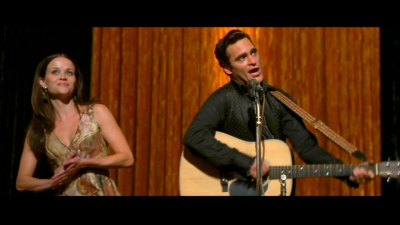
Walk the Line follows the rise and fall - and rise again - of Johnny Cash, who started out as the son of a dirt-poor cotton sharecropper in rural Arkansas, and who, through a desperation to come to terms with the loss of a beloved older brother and a need to exorcise his own personal demons, embarked on a legendary musical career that deeply influenced the country, rock, rockabilly, R&B, and even pop music genres. After a flash-forward to Cash's celebrated 1968's Folsom Prison concert, Walk the Line opens in the sweltering cotton fields of Arkansas, where young J.R. (Ridge Canipe) learns to love the gospels and hymns sung by his beloved mother Carrie (Shelby Lynne), learns to fear his drinking, abusive father Ray (Robert Patrick), and forms an incredibly tight bond with his Bible-studying older brother Jack (Lucas Till). Jack's horrific death (he was pulled into a table saw) permanently scars young J.R.; believing that he was always the "bad" son next to "good" son Jack, J.R. gets confirmation of that perception when his father verbally abuses him after Jack's funeral, exclaiming that God took the wrong son.
Leaving behind the cotton fields of Arkansas in 1950 for the airfields of Germany, John Cash (Joaquin Phoenix) joins up with the Air Force as a Morse code decoder, while writing love letters to a girl, Vivian (Ginnifer Goodwin), he dated for only a few weeks prior to his enlistment. Composing songs in his spare time (he buys a guitar for the first time), John also keeps track of the goings-on in the music scene, particularly of June Carter (Reese Witherspoon), of the legendary Carter Family musical group - a favorite artist of John's growing up. Back in Memphis in 1954, John unsuccessfully tries to sell appliances door-to-door, while his wife Vivian wonders when he's going to get his act together and settle down as a successful provider. With one baby and another on the way - and with an eviction notice pending - desperation turns into action with John steeling his nerve and gathering his "front porch" bandmates, Luther Perkins (Dan John Miller) and Marshall Grant (Larry Bagby), to audition for Sun Records owner Sam Phillips (Dallas Roberts). It doesn't go well at first, but when pressed by Phillips to abandon the tired old gospel retread he opens with, John dredges up Folsom Prison Blues, a song he wrote in Germany, and a new musical style is born.
Hitting big with songs like Cry, Cry, Cry, Folsom Prison Blues, I Walk the Line, and Home of the Blues, Johnny embarks on a series of cross-country package tours with other soon-to-be musical legends like Elvis Presley (Tyler Hilton), Jerry Lee Lewis (Waylon Payne), Roy Orbison (Johnathan Rice), Carl Perkins (Johnny Holiday), and of course, June Carter. Johnny's immediate infatuation with lovely, talented June causes deep emotional turmoil for John, whose home life is becoming increasingly strained by Vivian's inability to understand (or perhaps more accurately, forgive) the temptations presented to a genuine rock star like Johnny Cash. Pills and groupies provide distractions and balms for Johnny's feelings of guilt, personal inadequacy and his unrequited love for June - a love that becomes maddening when Johnny senses that June indeed may have feelings for him, as well, but that she's terrified of his emotional inconsistencies and drug problem. Only when they're on stage, singing together, does Johnny feel total satisfaction with his life. Once Johnny and June finally succumb to their feelings for each other, the problems only multiply for Johnny (as June rightly calls from the start), with his pill addiction spiraling out of control. Will Johnny's concert at Folsom Prison be the start of a personal and professional comeback, and will he finally come to terms with his relationship with June?
There's a beautiful simplicity and power to Walk the Line that's a combination of Cash' own compelling life story and music, director James Mangold's insistence on keeping the film clean and uncluttered, and the sensational performances by the two lead actors. Mangold, whose earlier Cop Land was most impressive, reinvigorates the standard Hollywood musical biopic by making sure that the straight musical performance sequences operate as much like dramatic scenes as chances for the audience to hear Cash's music. Although most of the songs are set up as stage performances (except for a lovely little montage sequence Mangold sneaks in, which looks like it's straight out of a 1930s Warner Bros. meller), they operate almost like musical sequences from movie musicals like West Side Story or Oklahoma!, in that not only are the songs themselves commenting on past and future actions in the storyline, but the sequences themselves frequently involve Johnny and June working out their relationship while they sing.
Mangold is also careful to keep his visual field simple and his camerawork restrained (yet with no loss of directed information), letting the force of the actors do the trick in keeping the audience's attention. Mangold has a real feel for the places and atmospheres he captures here. From the relentless tracking shots at Folsom that open the picture (again, providing a feeling not unlike the Warner Bros.' 1951 programmer, Inside the Walls of Folsom Prison, which inspired Cash to write his famous blues single), to the primal, almost Biblical severity of the Arkansas sequences, Mangold is attentive to the sounds (the boots stomping in the prison, the incessant chirping of the insects in the crushing Arkansas heat, the rain coming down in Memphis when Johnny cuts his first record) and images (the darkening sky behind the Cash boys as they walk along a dusty road, the shimmering loveliness of Reese Witherspoon's anguished face, as shot through her car windshield) that firmly root Walk the Line in a recognizable time and place.

As for the performances in Walk the Line, again, it's a credit to Mangold that he keeps the leads silent (or often times low-key) in so many passages, allowing us the chance to explore their faces, looking for clues to their feelings and motivations, rather than having all of it spelt out for us in crude exposition. One of the best scenes in the film is when Johnny escorts June back to her hotel room, right after her first divorce. She's obviously attracted to him, as he clearly is to her (he tries to kiss her, but she demurs); it's the first scene where we see a real possibility of a physical and romantic connection between these two characters. And Mangold, knowingly, keeps us riveted in tight, tight close-ups, to the actors' faces, while they deliver their dialogue in whispery hushes (Witherspoon is particularly appealing here). Mangold displays an extraordinary perception as to how the actors work within his simple frame (and his subtly intricate editing scheme), particularly when the more melodramatic moments of Cash's life could have been broadly over-indulged.
It's difficult to find fault with the two leads here (as well as the superb supporting cast). Joaquin Phoenix, wisely avoiding an imitation of Johnny Cash (who could possibly do that?) isn't as physically big or imposing as Cash was on the stage and screen (I saw him once in concert back in the mid-70s, and he seemed immense), and his sometimes soft, hesitant voice at first doesn't seem to jibe with our later impressions of Cash on TV and in concert, with that rambling, rough baritone. But critically, Mangold was looking for an actor to portray the Johnny Cash that most people weren't familiar with: the young, deeply in love, messed-up Cash who was struggling to find some kind of peace and balance in his early tumultuous life. And to this end, Phoenix is perfect. Vulnerable under the growling and the strutting on stage, Phoenix's Cash displays none of the "legendary," "iconic" trappings that a lesser actor might have felt was necessary to "match up" with Cash. As for his singing, it's terrific: evocative of Cash, but again, all his own.
For me, Walk the Line really comes alive whenever Reese Witherspoon is onscreen. I'm not sure I had much of a feeling one way or the other about her as an actress prior to Walk the Line. She was good in Election, but all that Legally Blonde stuff left me cold. But here, as the equally iconic June Carter Cash, Witherspoon pulls off one of the most accomplished, layered performances in a romantic film that I've ever seen. Her range here is remarkable, particularly when you factor in that she must sing her own songs, as well, representing one of the most important voices in the country music pantheon (as indeed, did Phoenix). In no way trying to diminish Phoenix's role, his Cash is the "easier" of the two in terms of being potentially showy or "dramatic." He gets to become addicted to pills, to fall apart for the audience, with big, dramatic scenes that we appreciate for their skill. Witherspoon's June, however, has to be there for him, but not simply as a crutch, but as an independent, wary, yet loving friend first - and then as an equally leery, conflicted lover. Watching Witherspoon in this role, it's amazing how versatile she is in conveying those conflicted emotions of friendship, love, concern, and sometimes, contempt - all within a few short sequences or shots. Watch her when the two are singing Jackson at the end of the film. Witherspoon's skill is such that she keeps smiling out to the crowd (June the performer), while dogging Johnny with veiled insults (June the fighter), while hesitating to deal with this crazy man anymore (June the fed-up, would-be lover and wife), until ultimately she breaks down, her eyes searching Phoenix's, nakedly and totally vulnerable, before finally agreeing to marry him. It's a breathtaking, tour de force moment, the equal of any similar moment from the screen's past great actresses, and most certainly worthy of the Oscar she so deservedly won.
And with the amazing chemistry that Witherspoon and Phoenix generate, particularly during their luminous stage performances, Walk the Line ultimately becomes less a factual, biographical examination of Johnny Cash the singer, and much more a beautifully tender, hopeful romance between two soul mates. Yes, the film does gloss over and abbreviate events in Cash's life that, had they been depicted by Mangold as realistically as his romance with June, might have put people off the film (Cash repeatedly cheating on his wife with groupies is reduced to one chaste kiss; other arrests and abuses - no doubt hurtful to those around him - due to his severe drug addiction are somewhat "prettily" portrayed, with Cash's other eccentricities nowhere to be found). But ultimately, the "facts" of Johnny's and June's life (the director states that the film is quite accurate) become secondary to the emotion that's palpable on the screen. In cinematic terms of getting that heartbreaking, bittersweet feeling of loving someone you're not supposed to, and then finding in that same person a chance, a hope of redemption through their love - despite seemingly insurmountable circumstances - Walk the Line has few equals.
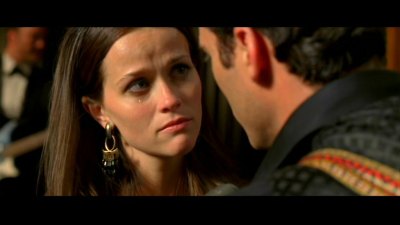
The DVD:
The Video:
The anamorphically enhanced, 2.35:1 video transfer for Walk the Line: Extended Cut looks amazingly clean and clear, with a perfectly balanced color range, and no compression issues to speak of (it looks to be the same transfer used for the previous DVD releases).
The Audio:
The same audio options from the previous 2-disc release are here, including a massive Dolby Digital 5.1 DTS mix, a 5.1 Surround, a perfectly acceptable 2.0, as well as French and Spanish 3.0 Surround mixes. English and Spanish subtitles are available, as well as close-captions.
The Extras:
Okay, here we go on that "extended cut." Before I list what's been added to the theatrical and previous DVD editions of this film, let me just say I'm usually nonplused by post-theatrical tampering. Deleted scenes that didn't make it into the final theatrical release usually (and I stress "usually") are left out for a good reason, and their inclusion does little to benefit the film - except in DVD sales. The original theatrical version of Walk the Line for my money worked beautifully at 135 minutes. This new extended version runs 153 minutes, and while I wouldn't say it's padded, the additional scenes don't make any clearer the points director Mangold wanted to make in the first version. Almost all of the new material is lifted from the "Deleted Scenes" that were already included in the first two DVD releases of the film, so they won't be a big surprise here to owners of those discs. The only genuinely "new" sequence I detected in this new "Extended Cut" were two scenes showing Johnny in Germany. One is a brief shot of him carrying his newly purchased guitar back to base (and seeing a newspaper that says Hank Williams had died), and a following sequence, showing Johnny writing a love letter to Viv while working as a Morse code decoder. A couple of soldiers make fun of him; his commanding officer glares at him, and that's about it. Everything else "new" in this "extended cut" are deleted scenes already released on DVD, reinserted into the film. Here are the changes in this new "extended cut" version:
Cry, Cry, Cry, where Johnny composes his first hit, is placed right before his audition for Sun.
Broken Record, featuring John Carter Cash, has been put back, showing Cash's naivete concerning the recording process.
Ezra & Maybelle Carter, a short introduction of June's parents to Johnny, has been put back.
I Still Miss Someone, where Johnny tries to compose a heartbreaking song about June, has been put back, but the very tail end of the sequence, where Johnny dreams he sees Viv transformed into June (available in its entirety on the previous two DVDs) has been clipped off here.
On the Phone, where Johnny is seen agreeing to go to a music awards show, has been put back.
The Sermon, where Johnny goes to church with June after his recovery, is included here and extended for a few seconds (from the previous length included in the other DVDs' extras), with a brief shot of a neighboring parishioner, clasping Johnny's hand during a hymn.
Memphis Streets, where Johnny interacts with a fellow appliance salesman, and At the Bank, an extended version of the check-cashing sequence already in the film, have not been reinserted into the film, and now head up the small Deleted Scenes option.
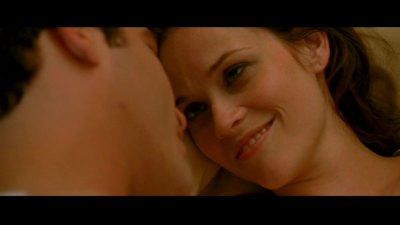
Returning extras for this "extended cut" of Walk the Line include the original theatrical trailer, and the same director's commentary that was included in the first two DVD releases (interesting and well-spoken, particularly when he's focused on the film, but some of his comments about completely different film acting and singing styles - comparing, negatively, Cary Grant to James Dean, and Doris Day and Bing Crosby to Johnny Cash - were a little loopy). Celebrating the Man in Black: The Making of Walk the Line, which runs (21:26), is back and features the cast and crew (and other performers such as Kris Kristofferson) discussing the production of the film, and Ring of Fire: The Passion of Johnny & June, running 11:27, with writers and artists Steve Pond, Alanna Nash, Bill Miller, John Carter Cash, Marty Stuart, Don and Harold Reid, Patrick Carr, Jason Fine, Jay Orr, Joaquin Phoenix, and Kris Kristofferson discussing the relationship between these two iconic music figures. The Johnny Cash Jukebox: Walk the Line Extended Musical Sequences with New Introductions features eight performances from the film, some longer than what appears in the film, and all with optional intros by various writers and performers who give a quick background on the song. Included songs are:
Lewis Boogie - Waylon Payne as Jerry Lee Lewis (commentators include Mikal Gilmore, Rolling Stone contributing editor; Jack "Cowboy" Clement, Johnny Cash record producer; actor Waylon Payne, Jason Fine, Managing Editor Rolling Stone; actor Johnny Holiday, and John Carter Cash).
Get Rhythm - Joaquin Phoenix as Johnny Cash (commentators include John Doyle, Curator, Rock 'N' Soul Museum; Steve Pond, contributing editor, Rolling Stone; Jason Fine).
You're My Baby - Johnathan Rice as Roy Orbison (commentators include Mikal Gilmore, John Doyle, Johnathan Rice).
Jukebox Blues - Reese Witherspoon as June Carter (commentators include James Keach, Producer; Arianne Phillips, costume designer; Mikal Gilmore, John Carter Cash, Reese Witherspoon).
Rock and Roll Ruby - Joaquin Phoenix as Johnny Cash (commentators include James Mangold, Director; Jay Orr, Historian, Country Music Hall of Fame; Jack "Cowboy" Clement).
That's Alright Mama - Tyler Hilton as Elvis Presley (commentators include John Doyle; Scotty Moore, Elvis' guitarist; Mikal Gilmore; Jack "Cowboy" Clement).
Jackson - Joaquin Phoenix as Johnny Cash, Reese Witherspoon as June Carter (commentators include Steve Pond, Jay Orr, Patrick Carr, Cash biographer).
Cocaine Blues - Joaquin Phoenix as Johnny Cash (commentators include Jack "Cowboy" Clement, John Doyle, Steve Pond).
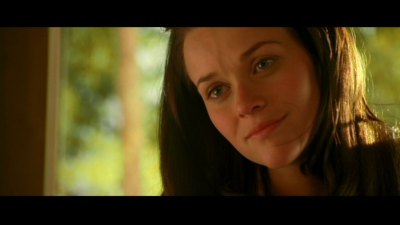
Becoming Cash/Becoming Carter (11:02), which looks further at the two lead performances, includes commentary from Cathy Konrad, Producer; James Mangold; Gill Dennis, Co-Screenwriter; John Carter Cash, actors Robert Patrick, Reese Witherspoon, and Joaquin Phoenix; T Bone Burnett, Music Director; and Phedon Papamichael, Cinematographer. Sun Records & the Johnny Cash Sound (11:53) gives an interesting look at the legendary Memphis studio, with commentary by artists Kris Kristofferson, Chris Isaak, Robert Earl Keen, and Marty Stuart; Brenda Colladay, curator, Grand Ole Opry; Jack "Cowboy" Clement; Steve Pond; James Lott, Chief Engineer, Sun Studio; John Doyle; John Schorr, General Manager, Sun Studio; Jay Orr; Patrick Carr, biographer; actors Joaquin Phoenix, Larry Bagby and Dan John Miller; Jason Fine Scotty Moore, Waylon Payne, Henry Rollins, and David Brookings, Sun Studio Tours. The Cash Legacy (15:20) looks at the career impact of Cash's music and life, with commentators Kris Kristofferson, Willie Nelson, John "Cougar" Mellencamp, Steve Pond, Jason Fine, Kid Rock (?), Trent Reznor, Alanna Nash Historian, Mike Ness, Don Reid, Robert Earl Keen, Chris Isaak, Henry Rollins, Steve Earle, Bill Miller, author; Jay Orr, Merle Haggard, Patrick Carr, Marty Stuart, Ozzy Osbourne (?), and John Carter Cash. Folsom: Cash and the Comeback (11:45) looks at the famous concert Cash gave at the California prison in 1968, with comments by Marty Stuart, Steve Pond, Kris Kristofferson, Patrick Carr, Jason Fine, Jay Orr, Don Reid, "Coach" Lloyd Kelly, Recreation Director, Folsom Prison; Lt. Robert Trujillo, Public Information Officer, Folsom Prison; Harold Reid, and Bill Miller. Cash and Faith (11:12) looks at Johnny's complex relationship with God, and the personal struggles he had as a result, with commentary by Joanne Cash Yate, Johnny's sister; Pastor Harry Yates and Paster Jimmy Snow, spiritual guides to Cash; Bill Miller, John Carter Cash, Marty Stuart, and Patrick Carr.
Final Thoughts:
Owners of either previous DVD releases of Walk the Line: Extended Cut may have a tough time justifying this double (or even triple!) dip. The so-called "extended cut" contains only one truly new sequence, and it's very brief (and though interesting, not revelatory). The new extras are great, but again, unless you're a Cash fanatic, you might be satisfied with the previous DVD releases, which had a few of the same extras (the new extras are pretty cool). A rental would do for you, to see if you must have this version. Newcomers, though, might want to check this out; I still prefer the shorter theatrical version of the film (and by rights, it should have been included here), but I'm not going to knock any chance for new viewers to catch this wonderfully tender, moving love story. Joaquin Phoenix is electrifying as the troubled Cash, and Reese Witherspoon joins the ranks - with this performance alone - of the screen's great actresses with her stunning, heartbreaking portrayal of June Carter Cash. Their chemistry together on screen is palpable, making for one of the most memorable love stories I've seen in films. I recommend Walk the Line: Extended Cut.
Paul Mavis is an internationally published film and television historian, a member of the Online Film Critics Society, and the author of The Espionage Filmography.


|
| Popular Reviews |
| Sponsored Links |
|
|
| Sponsored Links |
|
|
| Release List | Reviews | Shop | Newsletter | Forum | DVD Giveaways | Blu-Ray | Advertise |
|
Copyright 2024 DVDTalk.com All Rights Reserved. Legal Info, Privacy Policy, Terms of Use,
Manage Preferences,
Your Privacy Choices | |||||||









